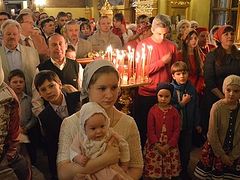Fr. Andrei was assigned to the Church of the Protecting Veil of the Theotokos right after his ordination. He established warm and even friendly relations with its rector, Fr. Gennady. The latter valued the young priest’s assiduity, industriousness and the ability to be amiable and obliging with everyone. Not only did Fr. Andrei take the Sunday school lessons for children onto himself, he also organized religious instruction for adults. He would often stay after services, talking with people and answering all sorts of questions, both doctrinal and mundane. The parishioners came to love Fr. Andrei very soon.
They often sought his counsel and confessed their sins to him. Even many of Fr. Gennady’s spiritual children began to come to Fr. Andrei for confession. The rector took it easily and was not jealous of the young priest. He was even happy to have a new, good assistant on whom he could always rely in everything.
However, the state of mind of the choir director Zinaida Dmitrievna was turbulent. “How can it be?” she was exasperated. “He has been here next to no time but he has already enticed spiritual children from the rector.” She saw Fr. Andrei’s merits and would even read his poetry (which were published by his friends in booklets with small circulation) secretly. But she took a strong dislike to him, though she enjoyed his poetry and appreciated his civility (something very few modern young people have) and absolute lack of pride in spite of his numerous virtues. And she had an obvious reason for her aversion. One day Fr. Andrei said he preferred the Znamenny chant.1 She had sung polyphonic singing her entire life and it was unbearable for her to hear praise of singing in unison. The choir she had conducted for many years would sing hymns with some additions she had composed herself. She considered herself a moderate reformer and was proud of having a reputation as a Church composer in some circles. But like a bolt from the blue she was now faced with criticism of the things she had always lived by. And it came from someone who was three years younger than her grandson! Though among those who criticized polyphonic singing were some of her peers. An awardee of the Order of Princess Olga Equal-to-the-Apostles, she took the path of serving the Orthodox Church at a time when these faultfinders were still sitting idly at the Communist Party meetings (and saying that “there is no God”), and before some of them were born. These faultfinders should not be given too much freedom. Something should be done, she thought…
And she proceeded to action. Every day she went to the rector with complaints about Fr. Andrei. The pretexts were trifling and simply absurd. Very soon Fr. Gennady grew weary of these complaints. In his time he had suffered much because of denunciations and he couldn’t stand tattlers. But he could do nothing with an grown woman who was the diocese’s oldest choir director. He himself found it hard to tolerate her “solo performances” with which she “embellished” festal services. He would often remark jokingly that a church and an opera theater are two different operations. But Zinaida Dmitrievna pretended not to hear him, believing that it did not apply to her, continuing to fill the church space with her singing, taking such high notes that the congregation would stand rigid in terror. Sometimes it sounded like a rooster crowing, sometimes it seemed that her soul would fly away from excessive vocal strain.
Fr. Andrei knew that the choir director was beefing about him all the time. He did not know how to make up with her and how to calm down this woman who just didn’t like him. One day after a Sunday service he brought her a bunch of flowers—chrysanthemums. When he started saying how much he esteemed her labors and there was no one else in the whole diocese to have worked in the vineyard of Christ so gloriously, she suddenly burst into sobbing:
“I know the language of flowers. You want to push me out of the church. ‘The Chrysanthemums in the garden have withered long ago.’2 Don’t count on it…”
They calmed her down with great difficulty. Fr. Andrei concluded that any move from his part aimed at reconciliation would be interpreted as an attempt to offend the poor choir mistress. So he started to avoid her: he did not go into the refectory when Zinaida was having lunch there and seeing her from a distance he would stop and walk in the opposite direction. This did not remain unnoticed and was interpreted almost as a declaration of war.
Then “Madame choir director” (as Fr. Andrei called her to himself) decided to deal him the final blow for what she considered to be an “obvious crime”. The fact is that from time to time while reading the Gospel Fr. Andrei laid stress on some Church Slavonic words incorrectly. As a rule, he would correct himself immediately, though at times he proceeded without noticing his errors.
Every time it made Zinaida moan about him. The rector would hear the woman out without expressing any emotions and say that once the well-educated priest gained enough experience, he would stop making errors.
One day, after the Divine Liturgy and a prayer service on the patronal feast, the parishioners gathered in the refectory. Everybody was in a joyful frame of mind. They were waiting for the rector to bless the food. In the meantime, Zinaida Dmitrievna burst into the office of Fr. Gennady who was sorting out the flowers they had received for the feast:
“Father, what shall we do with Fr. Andrei? He has even made two errors at the feast! You know, the demons rejoice when someone makes mistakes while reading the Gospel. I can’t stand it any longer. I get upset and start crying every time. What shall we do?!”
Fr. Gennady placed a bunch of red roses in a cut-glass vase, sighed and looked at the weeping woman tenderly:
“Let’s thank about this.”
“Let’s do!” Zinaida let out a sob.
“You say the demons rejoice when someone makes mistakes while reading the Gospel.”
“Yes, they do.”
“And you get upset and cry.”
“Yes, I cry.”
“Well, what can I say? It means you’re not a demon!”
The door of the office was left ajar throughout the conversation and Fr. Andrei with the parishioners who were going to greet Fr. Gennady on the feast-day heard everything, standing behind the door. Several people burst out laughing loudly. Fr. Andrei thought that Zinaida was offended and decided to console her. But when he went into the office he was amazed to see her laughing. Still laughing, she came up to him, bowed and asked for his blessing for the first time:
“That’s how the enemy made me go against you,” she said, wiping her tears. “Forgive me. Truly, Fr. Gennady has brought me to my senses. I hope you don’t doubt it, that I am not a demon?”
That same evening Fr. Andrei gave her some CDs of Byzantine chant performed by Greek cantors and Athonite monks.
And during the Nativity season, Zinaida Dmitrievna’s choir sang some hymns in Znamenny chant for the first time.




